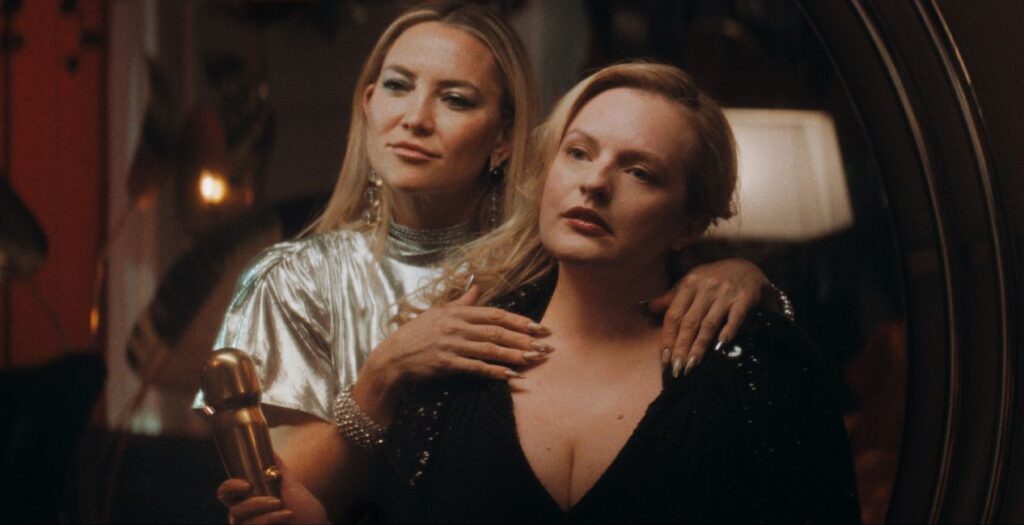Max Minghella’s Shell is one of three films tackling body image and aging at Toronto International Film Festival this year. Aging actresses being replaced by younger talent has always been ample territory for film, with the topic seeing a resurgence in recent years in the horrorscape. With beauty standards and anti-aging procedures increasing, there are plenty of stressors to exploit creatively, but it is difficult to add something new to the conversation. This is apparent in Shell. Aside from its fascinating take on the anti-aging science used in the film, the result is a tonally confused, half-baked attempt at a girl power moment.
Actress Samantha (Elisabeth Moss) is on the decline. As a mid-sized woman in her 40s, her star power is rapidly dwindling. Her competition consists of 20-year-olds, most embarrassingly a young woman (Kaia Gerber) she used to babysit. Her psoriasis flare-ups are a great source of anxiety for her. At the forceful urging of her agency, Samantha schedules a consult about the Shell treatment.
The science behind the Shell treatment is arguably one of the most fascinating parts of the body horror comedy. Harnessing the enzymes secreted by lobsters and similar creatures, Samantha is successfully talked into the procedure by Doctor Hubert (Arian Moayed), and, in a quick time jump, things have changed. She’s got the role of her dreams, hooking up with guys, and has leveled up. But then, strange calcifications form on her skin, prompting panic and paranoia to ensue. This is further amplified by the 68-year-old CEO, Zoe Shannon (Kate Hudson), who pokes and prods at Samantha to keep her under her thumb under the guise of support.
It is clear that Minghella and writer Jack Stanley proudly wear their inspiration in Shell. From its opener featuring Elizabeth Berkley, which almost seems evocative of Hitchcock and 90s-era thrillers, to the henchman in black with red gloves evoking a little mix of Giallo and Cold-War-era spy thrillers, there are a variety of referential points that snatch attention. Perhaps this is why, in the span of the film, there’s no clear identity to the piece. Instead, the film flounders, dabbling in different eras, before trying to eke out a tension and paranoia that is more flaccid than spine-tingling.
With the resurgence of brand-new symptoms post-procedure, moments of body horror invite comedy. Puking black blood, the arrival of calcifications, and a general decline in physical appearance give plenty of room for experimentation. The puking hits hilarious beats, but the sense of urgency and strangeness that should be rearing its head, especially when Samantha is randomly whisked away by the Shell corporation, is a lost moment of opportunity.
Indeed, as Samantha soon devolves into conspiracy land, no moment is spared to dial things up. The urgency should be there, and yet, it’s not. Through both Moss’s delivery and general scenic pacing, the shift into paranoia conspiracy thriller territory fails to resonate. If anything, Este Haim’s Lydia, who works as Samantha’s assistant and confidant, seems to be the only one capable of raising the alarm in a believable way.
There’s little depth to Samantha, whom Moss plays with almost wide-eyed misplaced naivety. There are moments in Shell where an almost devilish tinge of malevolence threatens to emerge from Samantha, but it seems out of place. With little room to diverge from the script and much else to play with, Moss is underwhelming in what should be a plum role. And that’s not to say that she isn’t somewhat endearing, but the levels and layers that her Samantha could have taken are just not there.
Kate Hudson fares better as Zoe Shannon, taking the character to campy and cutting levels when paired with Moss. Despite her apparent heightened age, though, she reads immature. Even more damning is that there could have been room to explore how women, particularly those in power, are part of the problem in weaponizing bodily insecurities against others. There’s just a glimpse of it in the dynamic between Zoe and Samantha, but it never amounts to anything outside of passive-aggressive bitchiness.
Shell finally gets interesting in the film’s final 20 minutes but registers as tonal whiplash. The full B-movie body horror creature feature effect goes in full swing too late. It plants the seed in the audience’s head as to what could have been if the same kinetic energy could have been applied to the entirety of the film. Instead, it’s a tonally uncertain disaster, with just a touch of risk towards the end to kick the horror elements to an eleven.
And therein lies Shell‘s biggest issue. It seldom explores beyond surface-level interactions and does not seem confident enough to commit wholly to a direction. Instead, it’s almost like it’s going through the motions until it hits something that inspires itself enough to try to course correct. That’s part of why the girl power, coming-into-her-own ending registers as empty, with the internal moment of truth at the climax feeling more forced than not. When there is no confidence to commit, how can anyone believe what’s being shown?
While the film might have been a risk for Minghella, Shell fails to take any until its climax. Too timid to align with a tone and commit, the film dances around with what it wants to better, squandering its opportunity for anything significant to explore the topics it’s dealing with. Ultimately, we’re left with what could have been, and not even cute crustacean references can distract from it.
Shell played as part of the 2024 Toronto International Film Festival.
Shell (2024)
-
Rating - 4/104/10
TL;DR
While the film might have been a risk for Minghella, Shell fails to take any until its climax. Too timid to align with a tone and commit, the film dances around with what it wants to better, squandering its opportunity for anything significant to explore the topics it’s dealing with.







